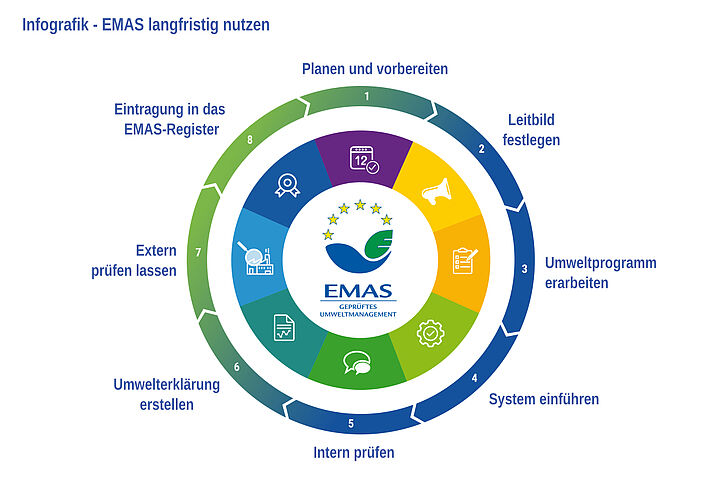The EMAS certification (Eco-Management and Audit Scheme) is an environmental management system (EMS) developed by the European Union that helps companies and organizations to continuously improve their environmental performance.
At TH Wildau the process of EMAS certification assists us in increasing the efficiency and effectiveness of our operational processes and in making our commitment to sustainability visible.
Since May 2024, the sustainability manager at TH Wildau has been coordinating the preparations for EMAS certification. The process takes between 12 and 24 months. After the first external validation, the improvement process will be continuously updated in accordance with the EMAS requirements.
All university members are invited to participate in the workshops offered for their teams, departments and work areas in the coming months. The aim of the workshops is to document the current situation regarding environmental impacts, to identify potential savings and to collect suggestions for measures to reduce waste, emissions, energy and material consumption.
What is EMAS?
EMAS is the world's most demanding and effective environmental management system. It is based on the international standard EN ISO 14001 and adds:
- systematic identification and evaluation of all environmentally relevant aspects
- measurable environmental performance through verifiable key figures
- transparency and credibility through the involvement and active communication with all those involved and affected by the organization/company, i.e. with so-called stakeholders
- internal and external audits to ensure that environmental obligations are being met in a transparent manner
Advantages of the certification process for TH Wildau
Improved environmental performance: By introducing a structured environmental management system, we can work together to identify measures for sustainable resource use, energy conservation, emission reduction, waste reduction and support for biodiversity, implement them step by step and continuously improve them.
Reputation and competitiveness: EMAS certification shows students, employees and the public that we take our environmental responsibility seriously.
Legal certainty: Regular monitoring of compliance with environmental regulations as part of EMAS helps us to minimize legal risks and, among other things, to meet the requirements of the Energy Efficiency Act (EnEfG).
Cost reduction: By using resources more efficiently and managing waste, we can reduce our operating costs in the long term.
Education and research: EMAS certification can be integrated into the curriculum, for example, to raise students' awareness of sustainability and environmental management issues. It also opens up new areas of research and opportunities for collaboration for interested researchers and instructors.
The systematic process of preparing for EMAS certification
(1) Comprehensive analysis of the current environmental impact of our university, including energy consumption, waste management, biodiversity, emissions, etc. using a context analysis approach and workshops with university members to document the current situation and identify potential savings.
(2) Development of an environmental policy that defines the goals and obligations of our university with regard to environmental protection.
(3) Creation of a detailed environmental program with specific measures and goals for improving our environmental performance and implementation of an environmental management system that ensures the continuous monitoring and improvement of environmental performance.
(4) Regular internal audits and management reviews to verify the effectiveness of our environmental management system and to make further improvements.
(5) Publication of an environmental statement that transparently presents the environmental performance of our university and is validated by an independent external environmental auditor.


